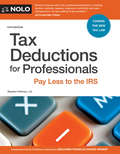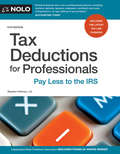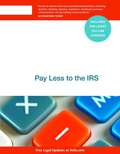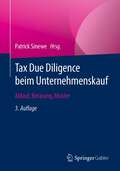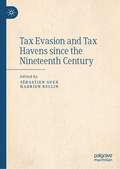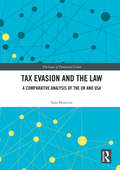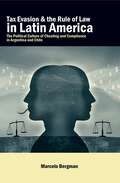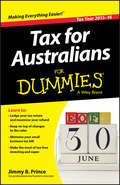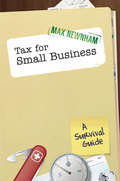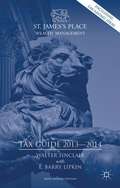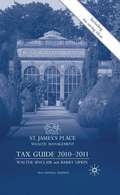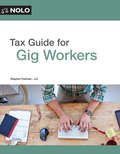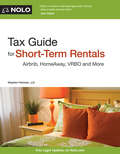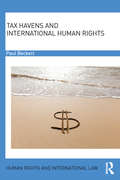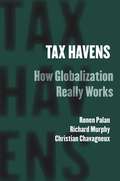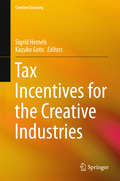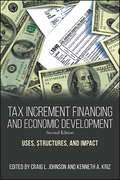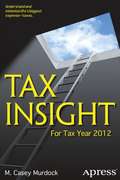- Table View
- List View
Tax Deductions for Professionals: Pay Less to the IRS
by Stephen FishmanA tax deduction guide just for professionals. Keep your taxes under control! Architects, lawyers, dentists, chiropractors, doctors, and other licensed professionals are subject to special tax rules. With this book, learn how to pay less to the IRS at tax time by taking advantage of valuable tax deductions you are entitled to take. Find out how to deduct: start-up expenses medical expenses under Obamacare retirement plan contributions continuing education costs vehicles, meals, and travel, and home office expenses. Tax Deductions for Professionals will also help you choose the best legal structure, with detailed information on limited liability companies, partnerships, and professional corporations. This edition includes comprehensive coverage of the new tax law (the Tax Cuts and Jobs Act) and how it affects professionals who have a business or are thinking of starting one.
Tax Deductions for Professionals: Pay Less to the IRS
by Stephen FishmanA tax deduction guide just for professionals Keep your taxes under control! Architects, lawyers, dentists, chiropractors, doctors, and other licensed professionals are subject to special tax rules. With this book, learn how to pay less to the IRS at tax time by taking advantage of the many tax deductions available to professionals. Find out how to deduct: start-up expenses medical expenses retirement plan contributions continuing education costs vehicles, meals, and travel, and home office expenses. Tax Deductions for Professionals will also help you choose the best legal structure, with detailed information on limited liability companies, partnerships, and professional corporations. The 15th edition is updated to cover changes under the Tax Cuts and Jobs Act.
Tax Deductions for Professionals: Pay Less to the IRS
by Stephen Fishman J.D.A tax deduction guide just for professionals. Winner of the Independent Book Publisher's Association's Benjamin Franklin Award. Keep your taxes under control! Architects, lawyers, dentists, chiropractors, doctors and other licensed professionals are subject to special tax rules. With this book, learn how to pay less to the IRS at tax time by taking advantage of valuable tax deductions you are entitled to take. Find out how to deduct: start-up expenses medical expenses under Obamacare retirement plan contributions continuing education costs vehicles, meals and travel, and home office expenses. Fully updated to cover all changes in the tax laws with updated tax numbers. Tax Deductions for Professionals will also help you choose the best legal structure, with detailed information on limited liability companies, partnerships, and professional corporations.
Tax Due Diligence beim Unternehmenskauf: Ablauf, Beratung, Muster
by Patrick SineweDie Due Diligence bezeichnet die gebotene Sorgfalt, mit der beim Kauf bzw. Verkauf von Personen- oder Kapitalgesellschaften, Betrieben oder Immobilien das zu erwerbende Unternehmen im Vorfeld der Akquisition von der Unternehmensführung und deren Beratern überprüft und analysiert wird. Die auch in Deutschland unverzichtbare steuerliche Untersuchung und Analyse des Zielunternehmens (Tax Due Diligence) dient dem Ziel, die mit der Akquisition verbundenen Chancen und Risiken im steuerlichen Bereich zu identifizieren. Sie ist Grundlage für die Aufnahme von Garantie-, Haftungs- und Freistellungsklauseln im Unternehmenskaufvertrag und kann unterstützend bei der Kaufpreisfindung herangezogen werden.Für die 3. Auflage wurde das Werk vollständig aktualisiert. Es beantwortet alle praxisrelevanten Fragen und stellt zahlreiche Musterformulierungen für den Bericht des Beraters und den Kaufvertrag zur Verfügung.
Tax Evasion and Tax Havens since the Nineteenth Century
by Sébastien Guex Hadrien BuclinThis collective book offers a panorama of the history of tax evasion, tax avoidance and tax havens from the nineteenth century to the present day, based on the latest research in contemporary history. It aims to show that this phenomenon is at the heart of global capitalism, partly as a response of the ruling classes to the rise of progressive taxation, but for other reasons too: notably the development of a powerful tax evasion and avoidance industry in different countries. The book argues that tax competition between states has stimulated the development of tax havens. It discusses the notion of the ‘tax haven’ and proposes a more rigorous concept - that of the ‘tax predator’. Finally, the book sheds light on the socio-political conflicts that have developed around tax evasion and the way in which states have fought against or tolerated the phenomenon.
Tax Evasion and the Law: A Comparative Analysis of the UK and USA (ISSN)
by Sam BourtonThis book provides a critical and contemporary evaluation of the laws and enforcement policies pertaining to tax evasion in the United Kingdom (UK) and United States (US). Since the inception of taxes, revenue collection authorities around the world have attempted to address the seemingly perennial problem of individuals evading their tax liabilities. The financial crisis has shone a new light on the issue with an increased interest in using the criminal justice system as a means of addressing it in the UK. In sharp contrast to the UK, the US has a strong record of prosecuting crimes of tax evasion, whether committed by individuals or professional corporate facilitators. Providing an evaluation of the UK’s tax evasion laws and enforcement policy, through a comparative approach, this work highlights insights provided by the US experience. In so doing, the book explores the interconnections between tax evasion and money laundering, identifying best practices, omissions, and areas for reform. The work will be a valuable resource for researchers, academics, and policy-makers working in the areas of financial crime, financial law, accountancy and criminal justice.
Tax Evasion and the Rule of Law in Latin America: The Political Culture of Cheating and Compliance in Argentina and Chile (G - Reference, Information and Interdisciplinary Subjects)
by Marcelo BergmanFew tasks are as crucial for the future of democracy in Latin America—and, indeed, in other underdeveloped areas of the world—as strengthening the rule of law and reforming the system of taxation.In this book, Marcelo Bergman shows how success in getting citizens to pay their taxes is related intimately to the social norms that undergird the rule of law. The threat of legal sanctions is itself insufficient to motivate compliance, he argues. That kind of deterrence works best when citizens already have other reasons to want to comply, based on their beliefs about what is fair and about how their fellow citizens are behaving. The problem of "free riding," which arises when cheaters can count on enough suckers to pay their taxes so they can avoid doing so and still benefit from the government’s supply of public goods, cannot be reversed just by stringent law, because the success of governmental enforcement ultimately depends on the social equilibrium that predominates in each country. Culture and state effectiveness are inherently linked.Using a wealth of new data drawn from his own multidimensional research involving game theory, statistical models, surveys, and simulations, Bergman compares Argentina and Chile to show how, in two societies that otherwise share much in common, the differing traditions of rule of law explain why so many citizens evade paying taxes in Argentina—and why, in Chile, most citizens comply with the law. In the concluding chapter, he draws implications for public policy from the empirical findings and generalizes his argument to other societies in Africa, Asia, and Eastern Europe.
Tax Expenditure Management
by Mark Burton Kerrie SadiqA tax expenditure is a 'tax break' allowed to a taxpayer or group of taxpayers, for example, by way of concession, deduction, deferral or exemption. The tax expenditure concept, as it was first identified, was designed to demonstrate the similarity between direct government spending on the one hand and spending through the tax system on the other. The identification of benefits provided through the tax system as tax expenditures allows analysts to consider the fiscal significance of those parts of the tax system which do not contribute to the primary purpose of raising revenue. Although a seemingly simple concept, it has generated a range of complex definitional and practical issues, and this book identifies and critically assesses the controversial aspects of tax expenditure and tax expenditure management.
Tax Fairness and Folk Justice
by Steven M. SheffrinWhy have Americans severely limited the estate and gift tax - ostensibly targeted at only the very wealthy - but greatly expanded the subsidies to low-wage workers through the Earned Income Tax Credit, now the single largest poverty program in the country? Why do people hate the property tax so much, yet seemingly revolt against it only during periods of economic change? Why are some groups of taxpayers more obedient to the tax authorities than others, even when they face the same enforcement regime? These puzzling questions all revolve around perceptions of tax fairness. Is the public simply inconsistent? A sympathetic and unified explanation for these attitudes is based on understanding the everyday psychology of fairness and how it comes to be applied in taxation. This book demonstrates how a serious consideration of "folk justice" can deepen our understanding of how tax systems actually function and how they can perhaps be reformed.
Tax For Australians For Dummies
by Jimmy B. PrinceTackle your tax with confidence and get the most from your returnDo you want to be sure you're getting the maximum tax refund? Of course you do! And Tax for Australians For Dummies, 2013-2014 Edition is the only resource you need to ensure that you get every cent you deserve. Written by respected tax specialist and CPA fellow Jimmy B. Prince, this book guides you step by step through the complex Australian tax system to help you understand exactly what you can claim and exactly what you're owed.Providing complete coverage of changes to tax legislation for tax year 2013-2014, as well as proposed changes that haven't made it into law yet, this book has you covered from every angle. Designed to help you take advantage of everything from investments to kids to government concessions, Tax for Australians For Dummies tells you everything you need to know to beat the taxman at his own game.Written specifically for Australian taxpayersFully updated for the 2013-2014 tax yearIncludes everything you need to maximise your tax refundContains essential new information on recent tax changes, including updated tax rates, FBT, CGT, and superannuation thresholdsWhether you're an employee, investor, small business owner, retiree, or even student, Tax for Australians For Dummies, 2013-2014 Edition is the easy-to-follow guide that answers all your tax questions.
Tax For Small Business
by Max NewnhamDon't just survive tax time -- discover how your business can thrive through tax time!Operating a small business isn't easy. Each day business owners are challenged with everything from supervising staff and negotiating with suppliers to managing payroll and inventory -- and, ultimately, turning a profit.Thankfully, ensuring that your business is tax-compliant is no longer the ordeal it used to be. Tax for Small Business: A Survival Guide is a must-have reference for Australian small businesses, with all the information you'll need to legally minimise your tax and maximise your business's profits. Topics covered include:the Simplified Tax System (STS)income taxsuperannuationcapital gains taxfringe benefits taxGST, BAS and PAYGworker's insuranceland tax.
Tax Guide
by Walter Sinclair Barry LipkinThe 41st annual edition of the leading guide to taxation in Britain. This practical and user-friendly guide is a bestseller with students, professionals, accountants and private individuals, explaining in simple terms how the UK tax system works and how best to minimise tax liabilities.
Tax Guide 2010–2011
by Walter Sinclair Barry LipkinThe 39th annual edition of the leading guide to taxation in Britain. This practical and user-friendly guide is a bestseller with students, professionals, accountants and private individuals, explaining in simple terms how the UK tax system works and how best to minimise tax liabilities.
Tax Guide 2011–2012
by Walter SinclairThe 40th annual edition of the leading guide to taxation in Britain. This practical and user-friendly guide is a bestseller with students, professionals, accountants and private individuals; explaining in simple terms how the UK tax system works and how best to minimise tax liabilities.
Tax Guide 2012–2013
by Barry LipkinThe 41st annual edition of the leading guide to taxation in Britain. This practical and user-friendly guide is a bestseller with students, professionals, accountants and private individuals, explaining in simple terms how the UK tax system works and how best to minimise tax liabilities.
Tax Guide 2014–2015
by Walter Sinclair Barry LipkinThe 43rd annual edition of the leading guide to taxation in Britain. This practical and user-friendly guide is a bestseller with students, professionals, accountants and private individuals, explaining in simple terms how the UK tax system works and how best to minimise tax liabilities.
Tax Guide for Gig Workers
by Stephen FishmanWritten for the growing numbers of freelancers who are part of the burgeoning gig economy. At least 10% of the American workforce are now gig workers who obtain jobs through online hiring platforms like Uber, Lyft, Upwork, TaskRabbit and many others. Gig workers are typically treated as self-employed, which means their taxes are far more complicated than those of traditional employees. Many gig workers lose valuable deductions or otherwise overpay their taxes or get in trouble with the IRS because they don’t understand the tax rules that apply to them. Tax Guide for Gig Workers explains everything gig workers need to know about taxes, including how they are classified for tax purposes, how to pay self-employment and estimated taxes, what deductions to take, how to lower their taxes by taking advantage of the new 20% pass-through deduction, what records to keep, how to file a tax return, and more. Whether you drive for Uber or Lyft, code for Upwork clients, or perform paid chores through TaskRabbit, this book gives you the practical information you need to minimize your taxes while avoiding problems with the IRS.
Tax Guide for Short-Term Rentals: Airbnb, HomeAway, VRBO and More
by Stephen FishmanThe complete tax guide for Airbnb and other short-term rental hosts As a short-term rental host, you’re entitled to many valuable deductions and other tax benefits. This book—the first of its kind—shows you how to pay no more tax than necessary on your rental income while complying with IRS rules. Learn everything you need to know about taxes, including: what deductions you should be taking how to report your short-term rental income how to deduct losses vacation home and tax-free rental rules how to allocate costs when you rent a room in your home, and how to keep proper records. Whether you rent your property through Airbnb, FlipKey, HomeAway, TripAdvisor, Craigslist, or VRBO, you want to make sure you understand these tax rules. That way, you can rest assured you are making the most out of your hosting business without risking problems with the IRS.
Tax Harmonization in the European Community
by George KopitsA report from the International Monetary Fund.
Tax Havens
by James Zumberge Eric Werker Sebastian Berardi Stelios Elia Omar MuakkassaMultinational corporations and wealthy individuals often use so-called tax havens to establish subsidiaries or holding companies in order to rebalance profits across borders with the primary purpose of lowering their effective tax rate. This note describes the use of tax havens, the implications for the financial sector in tax havens, as well as the debate around the effect of tax havens on welfare in other jurisdictions.
Tax Havens and International Human Rights (Human Rights and International Law)
by Paul BeckettThis book sails in uncharted waters. It takes a human rights-based approach to tax havens, and is a detailed analysis of structures and the laws that generate and support these. It makes plain the unscrupulous or merely indifferent ways in which, using tax havens, businesses and individuals systematically undermine and for all practical purposes eliminate access to remedies under international human rights law. It exposes as abusive of human rights a complex structural web of trusts, companies, partnerships, foundations, nominees and fiduciaries; secrecy, immunity and smoke screens. It also lays bare the cynical manipulation by tax havens of traditional legal forms and conventions, and the creation of entities so bizarre and chimeric that they defy classification. Yet from the perspective of the tax havens themselves, these are entirely legitimate; the product of duly enacted domestic laws. This book is not a work of investigative journalism in the style of the Pulitzer Prize-winning authors of The Panama Papers, exposing political or financial corruption, money laundering or the financing of terrorism. All those elements are present of course, but the focus is on international human rights and how tax havens do not merely facilitate but actively connive at their breach. The tax havens are compromising the international human rights legal continuum.
Tax Havens: How Globalization Really Works (Cornell Studies in Money)
by Richard Murphy Ronen Palan Christian ChavagneuxFrom the Cayman Islands and the Isle of Man to the Principality of Liechtenstein and the state of Delaware, tax havens offer lower tax rates, less stringent regulations and enforcement, and promises of strict secrecy to individuals and corporations alike. In recent years government regulators, hoping to remedy economic crisis by diverting capital from hidden channels back into taxable view, have undertaken sustained and serious efforts to force tax havens into compliance. In Tax Havens, Ronen Palan, Richard Murphy, and Christian Chavagneux provide an up-to-date evaluation of the role and function of tax havens in the global financial system-their history, inner workings, impact, extent, and enforcement. They make clear that while, individually, tax havens may appear insignificant, together they have a major impact on the global economy. Holding up to $13 trillion of personal wealth-the equivalent of the annual U. S. Gross National Product-and serving as the legal home of two million corporate entities and half of all international lending banks, tax havens also skew the distribution of globalization's costs and benefits to the detriment of developing economies. The first comprehensive account of these entities, this book challenges much of the conventional wisdom about tax havens. The authors reveal that, rather than operating at the margins of the world economy, tax havens are integral to it. More than simple conduits for tax avoidance and evasion, tax havens actually belong to the broad world of finance, to the business of managing the monetary resources of individuals, organizations, and countries. They have become among the most powerful instruments of globalization, one of the principal causes of global financial instability, and one of the large political issues of our times.
Tax Incentives for the Creative Industries
by Sigrid Hemels Kazuko GotoThis book combines insights from cultural economics, public finance, and tax law, providing an accessible and comprehensive introduction in the application of tax incentives for the creative industries. It does not have a single-country focus, but instead uses the perspective and examples of various countries around the world. The book starts with a theoretical part, introducing the concepts of creative industries and of tax incentives. In the globalized and digitalized world in which the creative industries operate, restrictions imposed by guidelines on harmful tax competition and state aid and regulations influencing the (im)possibility of applying tax incentives in cross-border situations have a great impact. For that reason these legal concepts are discussed as well in the theoretical part. The theoretical part is followed by a part that focuses on tax incentives for specific sectors of the creative industries, inter alia museums and cultural heritage, films, television and videogames, cultural investments, performing artists, and crafts and design. This part uses insightful examples from various countries to illustrate the application of these tax incentives. The last part includes policy recommendations on how tax incentives can be applied in an effective and efficient way for the creative industries. As the book takes both an academic and a practical approach, it is of relevance both to researchers and students and to policy makers and readers involved in the creative industry who seek an in-depth and up-to-date overview of this alternative way in which governments support the creative industries.
Tax Increment Financing and Economic Development, Second Edition: Uses, Structures, and Impact
by Craig L. Johnson; Kenneth A. KrizThis book brings together leading experts to examine the evolving nature of tax increment financing (TIF), the most widely used tool of local economic and community development. Originally designed as an innovative approach to the redevelopment of blighted areas, it has become a more general-purpose tool of economic and community development. Contributors offer case studies of the uses, structures, and impacts of TIF projects alongside more general discussions on the theoretical, financial, and legal bases for the use of TIF. They also explore its effect on overlapping jurisdictions such as cities, counties, and school districts. Some of the case studies capture TIF at its best—redeveloping areas that would likely never develop without substantial incentives. Other cases highlight questionable uses, especially where it has been used in new ways that those who developed the tool never envisioned.Originally published in 2001, the book was called "…a major contribution to the debate on the efficacy of such economic development financing tools as TIF…" by the journal Public Budgeting & Finance. Clear, comprehensive, and timely, this new edition features the latest research and thinking on TIF, including the political, legal, and even ethical issues surrounding its use.
Tax Insight
by M. Casey MurdockTax Insight: For Tax Year 2012 will teach you to take control of life''s biggest expense--taxes. In your lifetime, you will spend more money on taxes than on anything else. Despite that fact, you likely know the current prices of movies and milk but don''t know what your marginal tax rate is. You know where to get the cheapest gallon of gas to save a buck or two, but you don''t give a thought to the tax strategies you should be using right now that would save you thousands. Why? Is it too complicated and confusing? Too unpleasant? In Tax Insight, tax expert Casey Murdock opens up the world of taxes with amazing clarity and simplicity. As you will discover, you have within reach numerous ways to reduce your taxes. With everyday language and real-life examples, Tax Insight will give you the keys to minimizing your tax burden. This book contains information you need even if you have a tax advisor or use a program like TurboTax. Tax professionals are busy and sometimes too cautious, and programs often miss opportunities for you to save money. It''s also for those of all ages and income levels, including business owners. Tax Insight: Breaks down the key components of taxes with ease and simplicity. Provides a roadmap to paying as little tax as possible. Helps you know if you should do it yourself or hire a professional. While there are many encyclopedic books on taxes--like J. K. Lasser''s Your Taxes--there aren''t nearly enough that describe the tax code in plain language. Far more than a rehash of impenetrable IRS "help" documents, Tax Insights is organized the way most people think and presents ideas in clear, simple language. If you buy this book and take advantage of its advice, you will save money. What you''ll learn This book will help you: Avoid paying even a penny more in taxes than you should. Avoid common tax strategies that could actually cost you more than they save. Capture all of the deductions and credits that you are due. Know whether to file your own return or hire a tax professional. Utilize the entire year to implement tax-reducing strategies. Understand the key components of the tax return and how they work together. Prepare for or survive an audit Use real estate or a small business to reduce your tax bill Who this book is for Tax Insight: For Tax Year 2012 is for the frustrated taxpayer--the taxpayer who is frustrated by paying too much, frustrated by the complexity of the tax code, or frustrated because their CPA isn''t proactively helping them pay fewer taxes. Tax Insight is the perfect book for the person who is looking for a straightforward, simple explanation of the tax-saving strategies that are within reach. In an easy-to-read, easy-to-understand narrative, Tax Insight gives readers a thorough understanding of the tax strategies that apply to them and the information they need to put those strategies to work. Table of Contents The Tax Code Demystified Key Components Defined Income Dependents and Filing Status The Tax Code Is Rigged Employment Income Retirement Income Other Sources of Ordinary Income Tax-Free "Unordinary" Income from Non-Investment Sources Tax-Free Investment Income Taxable Investment Income Deductions from Investment Income Education Investment Strategies Retirement Investment Strategies--The Basics Retirement Investment Strategies--Alternatives Business Taxation Business Use of the Home Travel Expenses Meals, Entertainment, and Gifts Employee Benefits Employing Family Members Depreciation Real Estate Losses Real Estate Income and Deductions Second Homes and Vacation Rentals Medical and Dental Expenses Your Residence Your Children Charitable Contributions Education Expenses The Alternative Minimum Tax Penalties and Interest Do It Yourself, or Hire a Professional? Tax Implications of Health Care Reform
